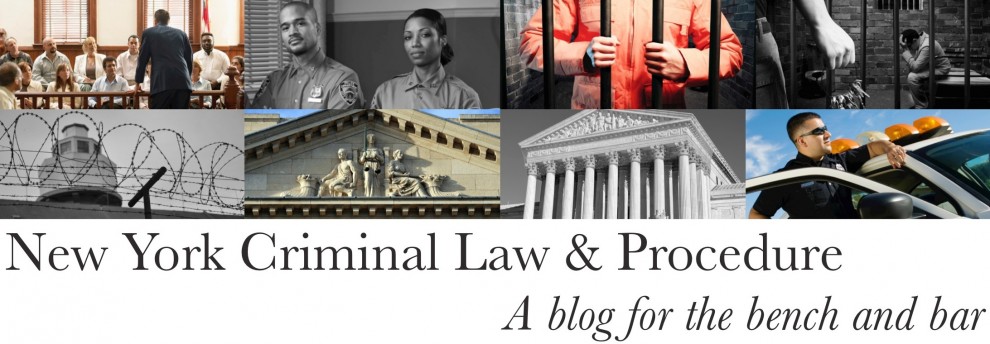In two conslidated cases, People v. Ortega (Ct. App. 11/23/2010) and People v. Benston (Ct. App. 11/23/2010), the Court of Appeals took up an interesting issue: whether medical records containing statements of a complainant were properly admitted at trial.
In Benston, the defendant was charged with assaulting a friend with whom he was temporarily staying. The complainant reported to hospital personnel that she was strangled by an ex-boyfriend with a black leather belt. The complainant did not testify at trial. Instead, the People admitted the complainant's medical record under the business record exception to the hearsay rule. Defense counsel moved to redact the portion of the record that related to domestic violence, the defendant's status as a former boyfriend, and the existence of a "safety plan" for the complainant. In Ortega, the defendant was accused of forcing the complainant to consume crack-cocaine against his will. After escaping, he went to the hospital. Medical staff wrote that he "was force to smoke [a] white substance from [a] pipe." This medical record was admitted.
The majority, in an opinion by Chief Judge Lippman, affirmed both convictions. The Court of Appeals found that the records were properly admitted under the business records exception. The court noted the test to differentiate admissible from inadmissible medical records: whether the complainants' statements were "relevant to diagnosis and treatment." The court agreed with several lower courts that how a patient was injured can be relevant, particularly in a domestic violence (Benston) or poisoning (Ortega) situation.
In Benston, the court found the references to "domestic violence" and a "safety plan" were relevant to diagnosis and treatment:
With all that has been learned about the scourge of domestic violence in recent decades, we now recognize that it differs materially, both as an offense and a diagnosis, from other types of assault in its effect on the victim and in the resulting treatment. In this context, a doctor faced with a victim who has been assaulted by an intimate partner is not only concerned with bandaging wounds. In addition to physical injuries, a victim of domestic violence may have a whole host of other issues to confront, including psychological and trauma issues that are appropriately part of medical treatment. Developing a safety plan, including referral to a shelter where appropriate, and dispensing information about domestic violence and necessary social services can be an important part of the patient's treatment.
However, it was error to admit the description of the belt as "black." This should have been redacted, because the color of the weapon was irrelevant to treatment.
In Ortega:
the statement that complainant was "forced to" smoke a white, powdery substance was relevant to complainant's diagnosis and treatment. As the trial judge reasoned, under such a scenario, complainant would not have been in control over either the amount or the nature of the substance he ingested. In addition, treatment of a patient who is the victim of coercion may differ from a patient who has intentionally taken drugs.
Judges Smith and Pigott concurred in separate opinions. Judge Smith's opinion, in my view, set forth a more direct and analytical approach to deciding the issue than the majority's. He separated out the question into two issues. First, is the medical record admissible as a business record (yes, because it is kept in the regular course of business). Second, is what the complainant told the doctor and nurses admissible as hearsay-within-hearsay. This is important because, as a lower court noted, "'Hearsay cannot be transformed into nonhearsay simply because a business routinely relies upon it and integrates it into its own records' (Second Med., P.C. v Auto One Ins. Co., 20 Misc 3d 291, 297 [Civ Ct, Kings County 2008])." The second level hearsay is admissible under a different exception: statements made for the purposes of medical diagnosis or treatment. I prefer this kind of analytical framework that separates out the levels of hearsay. (LC)



Gravity knives and testilying
I have previous written and blogged about testilying—the phenomenon of some police officers committing perjury to further their cases. The police who commit testilying view it as a small indiscretion serving a greater good, the conviction of a criminal. Testilying often comes about in the Fourth Amendment/suppression hearing context, where the police officer need only mouth certain "magic words" that establish probable cause, reasonable suspicion, or some other lesser standard.
In People v. Brannon (Ct. App. 5/5/2011) (Pigott, J.) (6-1), the issue was whether, in two companion cases, the police officers established sufficient reasonable suspicion that the defendants had gravity knives. The Court of Appeals held that reasonable suspicion in the gravity knife context requires specific facts that led the police officer to believe that the object was a gravity knife and not some other type of knife. But, ordinarily, a person cannot tell if an object is a gravity knife unless it is opened. The court responded:
Reasonable suspicion, however, does not require absolute certainty that the knife the individual is carrying is a gravity knife. Rather, the issue is whether, under the circumstances, the officer possessed specific and articulable facts from which he or she inferred that the defendant was carrying a gravity knife.
Using this standard, the court was able to distinguish the two cases. In Brannon, while the officer saw the "hinged top of a closed knife" and saw the "outline" of a knife in his pocket, he was unable to testify that it was a pocket knife. However, in Fernandez, the officer's testimony was that he saw the "head" of a knife and "based on his experience that gravity knives are commonly carried in a person's pocket, attached with a clip, with the 'head' protruding."
Judge Jones dissented from Fernandez but concurred in Brannon. He noted a key problem with the court's articulated standard:
In my view, had the officer in Brannon merely testified that he believed a gravity knife, and not a pocketknife, was present, then the outcome in that case would have been different. Instead of requiring the police and the People to articulate a specific factual basis for reasonable suspicion justifying these stops, in these types of cases, prosecutors will now be encouraged to present police officers who can describe their training and experience with gravity knives, and testify that a gravity knife, and not a "typical pocket knife", was observed. Given the highly intrusive nature of these stops, the acceptance of these conclusory statements at Mapp/Dunaway hearings as a minimal basis for the admission of evidence poses a significant danger.
(LC)
Leave a comment
Posted in Case Summaries, Commentaries, Constitutional Law, Ethics, N.Y. Court of Appeals, New Decisions, Suppression